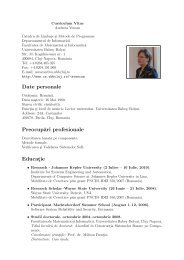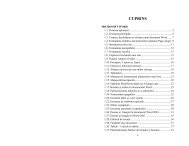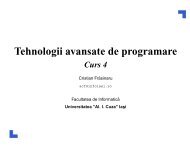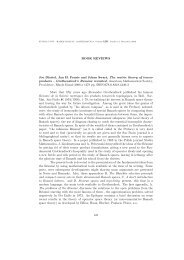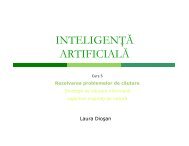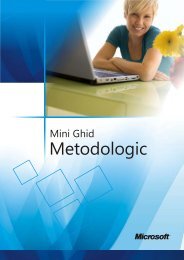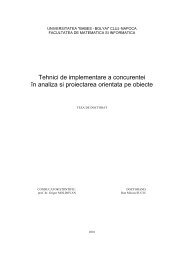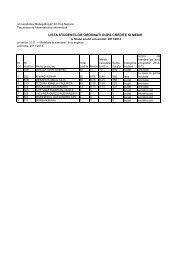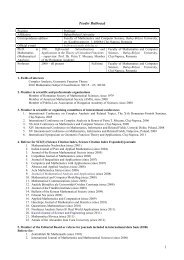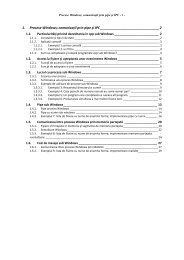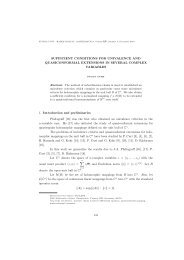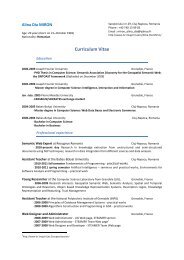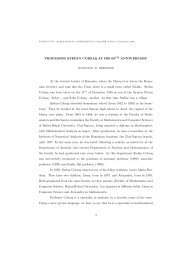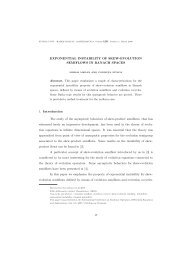CONTENTS
CONTENTS
CONTENTS
You also want an ePaper? Increase the reach of your titles
YUMPU automatically turns print PDFs into web optimized ePapers that Google loves.
234 MIHAIELA LUPEA (1)<br />
For reducing Π12 we apply the rule (S3). No extension of the initial theory satisfies<br />
the constraint L¬T , so the default sequent Π12 is reduced to a basic anti-sequent and<br />
therefore is a true sequent according to the following:<br />
Q,R,T,H,¬P ⇒¬T<br />
Π12:{M(P ∧S),L¬T };({Q,R},{d3= R:¬P<br />
H<br />
,d4= H:T<br />
T });{ Q<br />
S } ↦−→T (S3)<br />
Π2 can also be reduced to basic sequent/anti-sequents, therefore the initial sequent:<br />
∅; ({Q, R} , {d1, d2, d3, d4}); ∅ ↦−→ T is true and thus T is a skeptical constrained<br />
default consequence of ∆.<br />
5. Conclusions<br />
In this paper we have introduced an axiomatic system which formalizes the skeptical<br />
nonmonotonic inference in constrained default logic. This system is based on<br />
sequent and anti-sequent calculi for classical logics and uses specific rules for the<br />
defaults. Using the monotonic rules called residues and constraints for the applied<br />
defaults, the default reasoning process becomes a monotonic one.<br />
References<br />
[1] Bonatti, P.A., Olivetti, N., “Sequent Calculi for Propositional Nonmonotonic Logics”, ACM<br />
Trans. Comput. Log., 2002, pp. 226–278.<br />
[2] Lupea, M., “Nonmonotonic inference operations for default logics”, ECIT - Symposium on<br />
Knowledge-based Systems and Expert Systems, Iasi, Romania, 2002, pp. 1–12.<br />
[3] Lupea, M., “Axiomatization of credulous reasoning in default logics using sequent calculus”,<br />
10-th International Symposium SYNASC 2008, IEEE Computer Society, pp. 49–55.<br />
[4] Mikitiuk, A., Truszczynsky, M.,“Constrained and rational default logics”, Proceedings of<br />
IJCAI-95, Morgan Kaufman, 1995, pp. 1509–1515.<br />
[5] Milnikel, R.S., “Sequent calculi for skeptical reasoning in predicate default logic and other<br />
nonmonotonic logics”, pp. 1-40, Kluwer, 2004.<br />
[6] Reiter, R., “A Logic for Default reasoning”, Artificial Intelligence 13, 1980, pp. 81–132.<br />
[7] Schaub, T.H., “Considerations on default logics”, Ph.D. Thesis, Technischen Hochschule<br />
Darmstadt, Germany, 1992.<br />
[8] Stalnaker, R.C., “What is a nonmonotonic consequence relation”, Fundamenta Informaticae,<br />
21, 1995, pp. 7–21.<br />
(1) Babes¸-Bolyai University, Faculty of Mathematics and Computer Science, Cluj-<br />
Napoca, Romania<br />
E-mail address: lupea@cs.ubbcluj.ro



